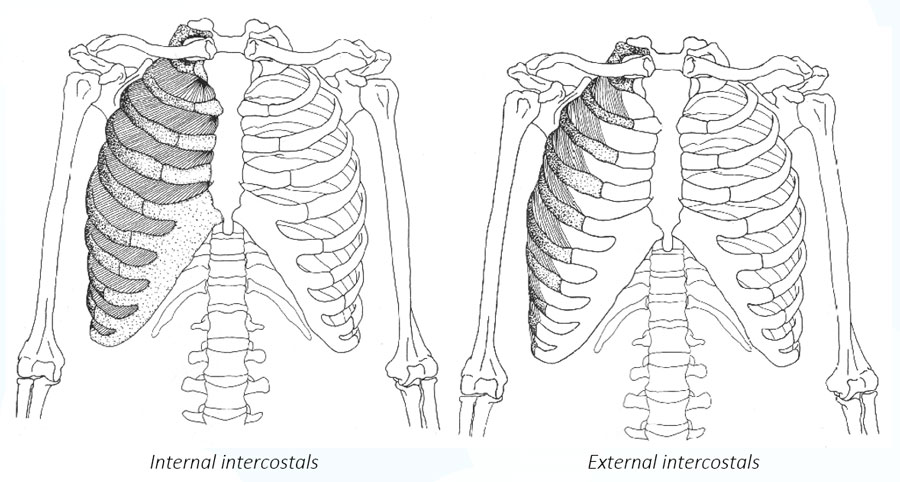
Intercostal Muscle Strain
Rib strains are injuries to any of the tendons or muscles that attach to the ribs. The strain can be the result of tearing or stretching of the muscle fibers. Sometimes you will hear of the rib strain being called an intercostal strain.
The muscles that work to expand the ribcage when breathing are the intercostal muscles. They are located between the ribs, which shorten to allow you room to expand the ribcage when breathing in and relaxing as you breathe out.
Strains commonly occur when the muscles or their tendons are torn or stretched causing a host of symptoms. You can strain the intercostal muscles when performing any forceful or exaggerated twisting of the body or swinging the arms. Sporting activities can also strain the muscle, such as baseball, racquet sports or golf. Direct blows to the ribcage occurring in tackle football can cause stretching and strain of the intercostal muscles. Repeated coughing can also cause this to occur.
Often an intercostal muscle strain can be confused with a rib fracture. Rib fractures are hard to diagnose, and are rarely X-rayed. If a rib is fractured, it will be left to heal on its own.
Intercostal Muscle Strain Anatomy
The chest is composed of 12 rib bones on either side of the body. Each one of the ribs is attached to the spine in the back part of the body. It then travels around to the front part of the chest. The top seven ribs are attached to the sternum, while the eighth thru the tenth are attached to the ribs above with cartilage and the eleventh and twelfth ribs are floating since they aren’t attached at the front part of the chest.
There are two intercostal muscle groups: the internal intercostals and the external intercostals.

How to Treat an Intercostal Muscle Strain:
- Rest
Cease participating in any sporting activities. Take time to rest as much as you can and limit torso movements. If you are continuing to play, you could end up injuring the strained muscle that much more.
Bed rest is not advised, and it would be unusual to require best rest following this injury. Gentle exercise is recommended, such as walking.
- Ice
Apply ice to the area for 5-10 minutes at a time three to five times per day. Remember to wrap the ice in a towel to prevent getting frostbite. Do this for one to two days after the injury or until the swelling and pain has subsided.
- Pain Medication
You can take an over-the-counter medication to help relieve pain. If you aren’t sure what medication to take or what dosage you need, you can get the proper guidance from a health care professional.
- Therapy
Discuss the injury with your therapist. Treatment and massage normally works well to loosen up the tight muscles, as well as mobilization to the ribs.
Tips:
- Make sure to spend a proper amount of time warming up before engaging in any physical activity.
- Training excessively is not advised as you can cause undue strain and tearing of the muscles surrounding the ribcage.
- Faster bowlers are more prone to this strain than regular bowlers.
- Allow yourself the proper time to heal from any training or activity.
- Lack of fitness is one of the biggest issues resulting in injuries to the intercostal muscles.
Sign Up
Sign up for your free trial now!
Get started with Rehab My Patient today and revolutionize your exercise prescription process for effective rehabilitation.
Start Your 14-Day Free Trial